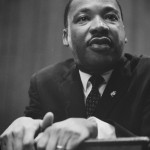 Several months ago I read an article in Christianity Today called “Pastor, Can I Come to Your Church?” The article detailed an experiment intended to gauge the level of implicit racial bias* in churches by studying how they responded to an email asking for information about the church. Emails were sent to 3,000 churches; the only difference between the requests was the name of the signer: each name suggested the writer’s ethnicity as white, black, Hispanic, or Asian. [*Implicit racial bias is made up of the stereotypes and attitudes that affect how we unconsciously think about and act toward something or someone.]
Several months ago I read an article in Christianity Today called “Pastor, Can I Come to Your Church?” The article detailed an experiment intended to gauge the level of implicit racial bias* in churches by studying how they responded to an email asking for information about the church. Emails were sent to 3,000 churches; the only difference between the requests was the name of the signer: each name suggested the writer’s ethnicity as white, black, Hispanic, or Asian. [*Implicit racial bias is made up of the stereotypes and attitudes that affect how we unconsciously think about and act toward something or someone.]
The results of the study, culled from 1,500 responses, were surprising and humbling. If you’re a church leader, you need to read the article; if you’re not, you should still read it.
I have long prided myself for my color-blindness. (That alone should have been a warning.)
After all, I’ve lived in four countries on two continents, including three months in the heart of Watts in South Central Los Angeles—on what police described as “the good end of the street with the highest crime in LA”, an area that was later decimated by riots. I went to high school with kids from more than a dozen nations. I’ve traveled throughout Europe and have spent time in Africa, Mexico, and South Korea. I dated an African-American girl while in the Air Force. I couldn’t be racist, could I?
But that article about implicit racial bias has stuck in my throat. I may not cross the street when approaching a black man on the sidewalk, but do I move my wallet to a front pocket? When I see an Arab-looking man in a public place, do I start thinking about escape routes…just in case? When I read of yet another police shooting, do I automatically assume it was justified?
About ten o’clock last night I went to the store to get Kleenex® for my sick daughter. At the only register open there was an argument between the white cashier and three black women. Though relatively calm, the customers were complaining that the cashier had been rude; she was trying to defend herself, explaining that she was simply following procedures—something about the amount of their purchase, identification, and possible identity theft.
With the argument still going on, the cashier rang up my purchase and I backed out of the line, still blocked by the upset customers. As I was leaving, a supervisor came over and tried, unsuccessfully, to explain the procedures the clerk had followed. I wondered what might have happened if the clerk had simply said, “I’m sorry. Will you please forgive me?”
The situation occupied my mind all the way home. I hoped the race card wouldn’t be pulled. I desperately wanted it not to be about race; it probably wasn’t…and at the same time, it probably was. Even if the cashier truly didn’t consider that the women were black; even if a self-checkout register would have resulted in the same ID check; in the customers’ minds, there is a race component, born out of hundreds of years of black oppression by whites.
Today is Martin Luther King Jr. Day in the U.S., a day set aside to remember the slain leader of the civil rights movement of the 1960s and, by extension, to consider the broader race situation in what politicians love to call “The Greatest Nation on Earth.” Judging by that race situation, the moniker is not well deserved. We have come far, but not too far…and certainly not far enough.
I don’t even know what “far enough” would look like, but I don’t have much hope of seeing it in my lifetime. But if we—if I—can start by becoming more aware of these implicit biases, and then try to change just one of those, maybe that’s a good start.
The apostle Paul wrote in Galatians 3:28, “There is neither Jew nor Greek, there is neither slave nor free, there is no male and female, for you are all one in Christ Jesus.” Sometimes it seems like an impossible dream—and it is, but for those last three words: in Christ Jesus.
